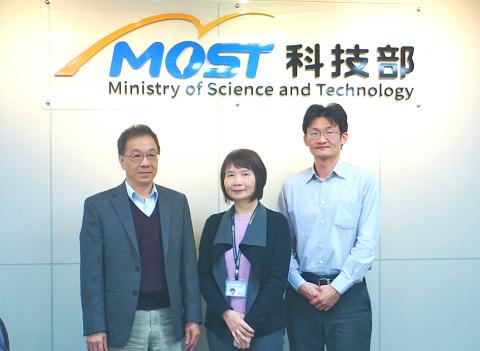Although the number of people in Taiwan who identify as Taiwanese has fallen since its peak of 75.15 percent in 2015, it has remained steady at 60 to 70 percent, the Ministry of Science and Technology yesterday told a news conference announcing the results of its Social Change Survey, which has been conducted for more than three decades.
In 1995, 32.13 percent of people in Taiwan identified as Taiwanese, Academia Sinica Institute of Sociology research fellow Lin Thung-hong (林宗弘) said.
It has since skyrocketed 43 percentage points and in 2015 topped 75 percent, he said.

Photo: Chien Hui-ju, Taipei Times
Although the theme of the survey varies from year to year, questions on important topics such as national identity are almost always included, he said.
The questionnaire asked participants whether they identified as “Taiwanese, “both Taiwanese and Chinese,” “both Chinese and Taiwanese” or “Chinese,” Lin said.
In 1992, when the question was first included, more than half of respondents said they have a dual national identity, but by 2015, the proportion had fallen to about 23 percent, he said.
For this year’s questionnaire, the researchers included questions about emerging technologies and the risks they pose, including views toward artificial intelligence, online information security, fake news and nuclear energy, he said.
The findings could also be applied to policymaking, researchers said.
For example, in 2017, 48.39 percent of men who earned less than NT$30,000 per month were unmarried — the highest ever, Lin said.
This year, the government raised the minimum monthly wage to NT$23,100, he said, adding that if employment conditions for young workers continue to improve, the marriage and fertility rates would rise.
The survey was begun by the ministry — which was then called the National Science Council — in 1984.
Topics have included family, education, social stratification, social mobility, political culture, communication, culture and value judgements, religion, interpersonal relations and social networks, institute research fellow and project leader Fu Yang-chih (傅仰止) said.
The survey has collected more than 125,000 responses over 34 years, researchers said.
It has been called one of the world’s largest surveys of its kind, its Web site said.
Taiwanese researchers have also participated in international collaborations to compare results from the survey with those from more than 30 other nations, Fu said.

Tropical Storm Gaemi strengthened into a typhoon at 2pm yesterday, and could make landfall in Yilan County tomorrow, the Central Weather Administration (CWA) said yesterday. The agency was scheduled to issue a sea warning at 11:30pm yesterday, and could issue a land warning later today. Gaemi was moving north-northwest at 4kph, carrying maximum sustained winds near its center of up to 118.8kph and gusts of 154.8kph. The circumference is forecast to reach eastern Taiwan tomorrow morning, with the center making landfall in Yilan County later that night before departing from the north coast, CWA weather forecaster Kuan Shin-ping (官欣平) said yesterday. Uncertainty remains and

SEA WARNING LIKELY: The storm, named Gaemi, could become a moderate typhoon on Wednesday or Thursday, with the Taipei City Government preparing for flooding A tropical depression east of the Philippines developed into a tropical storm named Gaemi at 2pm yesterday, and was moving toward eastern Taiwan, the Central Weather Administration (CWA) said. Gaemi could begin to affect Taiwan proper on Tuesday, lasting until Friday, and could develop into a moderate typhoon on Wednesday or Thursday, it said. A sea warning for Gaemi could be issued as early as Tuesday morning, it added. Gaemi, the third tropical storm in the Pacific Ocean this typhoon season, is projected to begin moving northwest today, and be closest to Taiwan on Wednesday or Thursday, the agency said. Today, there would likely

DISRUPTIONS: The high-speed rail is to operate as normal, while several airlines either canceled flights or announced early departures or late arrivals Schools and offices in 15 cities and counties are to be closed today due to Typhoon Gaemi, local governments announced last night. The 15 are: Taipei, New Taipei City, Taoyuan, Tainan, Keelung, Hsinchu and Kaohsiung, as well as Yilan, Hualien, Hsinchu, Miaoli, Chiayi, Pingtung, Penghu and Lienchiang counties. People should brace for torrential rainfall brought by the storm, with its center forecast to make landfall on the east coast between tonight and tomorrow morning, the Central Weather Administration (CWA) said. The agency issued a sea warning for the typhoon at 11:30pm on Monday, followed by a land warning at 11:30am yesterday. As of

CASUALTY: A 70-year-old woman was killed by a falling tree in Kaohsiung as the premier warned all government agencies to remain on high alert for the next 24 hours Schools and offices nationwide are to be closed for a second day today as Typhoon Gaemi crosses over the nation, bringing torrential rain and whipping winds. Gaemi was forecast to make landfall late last night. From Tuesday night, its outer band brought substantial rainfall and strong winds to the nation. As of 6:15pm last night, the typhoon’s center was 20km southeast of Hualien County, Central Weather Administration (CWA) data showed. It was moving at 19kph and had a radius of 250km. As of 3pm yesterday, one woman had died, while 58 people were injured, the Central Emergency Operation Center said. The 70-year-old